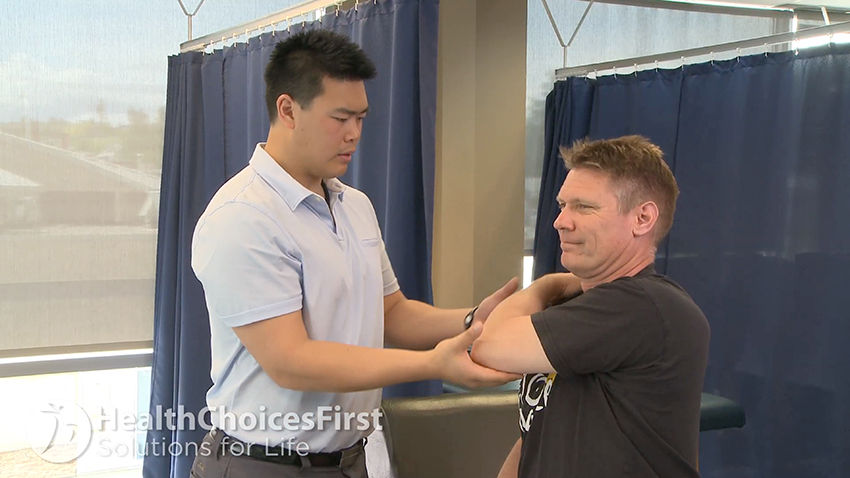Upper Body
Lower Body
General
Sports Related
Shoulder Surgery
Knowledge is Power.
True/False - Quiz: Do You Understand Shoulder Surgery?
Action Plan - Shoulder Surgery - Orthopaedic

Handout Shoulder Surgery - Post Operative Information
For patients that have currently undergone an orthopaedic shoulder surgery it is important to follow key instructions from your Orthopeadic Surgeon carefully. To help you in your recovery, the following is a list of commonly asked questions and answers.
- How long do I keep the bandages on after surgery? ANSWER: 3 - 4 days
- Can I shower after surgery? ANSWER: Yes, you may shower as long as you keep the wounds dry. After 7-10 days when the wounds are healed you can then shower without worrying about keeping the wounds dry.
- Should I put ice on the joint after surgery? ANSWER: Yes, you should ice the affected joint regularly, 10 -15 minutes on and then off. You may re-apply the ice once the skin returns to room temperature.
- Should I wear a sling after surgery? ANSWER: Yes, you should wear a sling to protect the shoulder from sudden movements or falling. It should be worn most of the time if there is a risk to the shoulder. If you are in a safe environment where there is no risk to the shoulder then you can remove the sling. However, you should not move the arm without the assistnace of the other arm and not through any pain.
- Should I be doing the pendulum swing? ANSWER: You may begin gentle pendulum swings if it is not uncomfortable for you.
- What exercises do I do? ANSWER: Prior to your first follow up appointment you should begin to move the arm with the other arm only through pain free ranges. You should not lift or reach for anything.
- How often do I do the exercises? ANSWER: You can work on your motion as many times as possible during the day without causing pain or discomfort.
- How soon after surgery can I drive? ANSWER: You are able to drive when you have full control and movement of both arms that will allow you to steer the vehicle rapidly to avoid a collision with another vehicle or pedestrian.
General Shoulder Information
The usual treatment for shoulder injuries is non-surgical options such as medications, bracing and physiotherapy. Shoulder surgery is generally only explored if the non-operative options fail, and the type the orthopaedic surgeon performs depends on the severity of your issue.
Arthroscopic Shoulder Surgery & Shoulder Replacement Surgery
Arthroscopic shoulder surgery (otherwise known as keyhole surgery) can be a good option for some patients. It is often performed to repair soft tissue injuries. In the past, orthopaedic surgeons had to make a large incision in an attempt to gain access into the joint. Arthroscopic surgery has enabled surgeons to introduce a fiber optic camera through a two- to three- millimeter incision. That allows the orthopaedic surgeon to magnify the structures on a TV screen and perform the procedure in finer detail. The benefits of arthroscopic shoulder surgery include a potentially shorter healing time, which means you can start rehab sooner.
For more severe shoulder injuries, surgeons may recommend a reverse shoulder replacement surgery. It is often done to repair rotator cuff tendons that have been damaged, often by arthritis. These rotator cuff tendons rotate the shoulder around and keep the ball and socket centered, but when they are no longer present or are deemed irreparable, the ball can slide upwards. When the head and socket are longer aligned, it changes the joint reaction forces, resulting in a different type of arthritis known as cuff tear arthropathy. These artificial shoulder implants last between 10 and 15 years.
Surgery for Shoulder Dislocations
 Patients with recurrent shoulder dislocations may benefit from surgical reconstruction of the damaged tissues in the shoulder joint. This usually involves an arthroscopic day procedure, where the surgeon identifies the torn labrum or ligaments that have occurred with each shoulder dislocation. The orthopaedic surgeon passes sutures through the ligaments and reattaches them to keep the ball in the socket. Following shoulder surgery, most patients will benefit from physiotherapy to get their range of motion back, decrease pain and increase strength.
Patients with recurrent shoulder dislocations may benefit from surgical reconstruction of the damaged tissues in the shoulder joint. This usually involves an arthroscopic day procedure, where the surgeon identifies the torn labrum or ligaments that have occurred with each shoulder dislocation. The orthopaedic surgeon passes sutures through the ligaments and reattaches them to keep the ball in the socket. Following shoulder surgery, most patients will benefit from physiotherapy to get their range of motion back, decrease pain and increase strength.
Talk to your healthcare provider if you'd like more information on shoulder surgery.
Visit HealthChoicesFirst.com for more videos and resources on orthopedics.
Print this Action Plan and check off items that you want to discuss with your healthcare provider
-
The usual treatment for shoulder injuries is non-surgical options such as medications, bracing and physiotherapy. Shoulder surgery is generally only explored if the non-operative options fail.
-
Arthroscopic shoulder surgery (otherwise known as keyhole surgery) can be a good option for some patients. It is often performed to repair soft tissue injuries, and enables surgeons to introduce a fiber optic camera through a two- to three- millimeter incision.
-
For more severe shoulder injuries, surgeons may recommend a reverse shoulder replacement surgery. It is often done to repair rotator cuff tendons that have been damaged, often by arthritis.
-
Patients with recurrent shoulder dislocations may benefit from surgical reconstruction of the damaged tissues in the shoulder joint. This usually involves an arthroscopic day procedure, where the surgeon identifies the torn labrum or ligaments that have occurred with each shoulder dislocation.
-
Following shoulder surgery, most patients will benefit from physiotherapy to get their range of motion back, decrease pain and increase strength.

